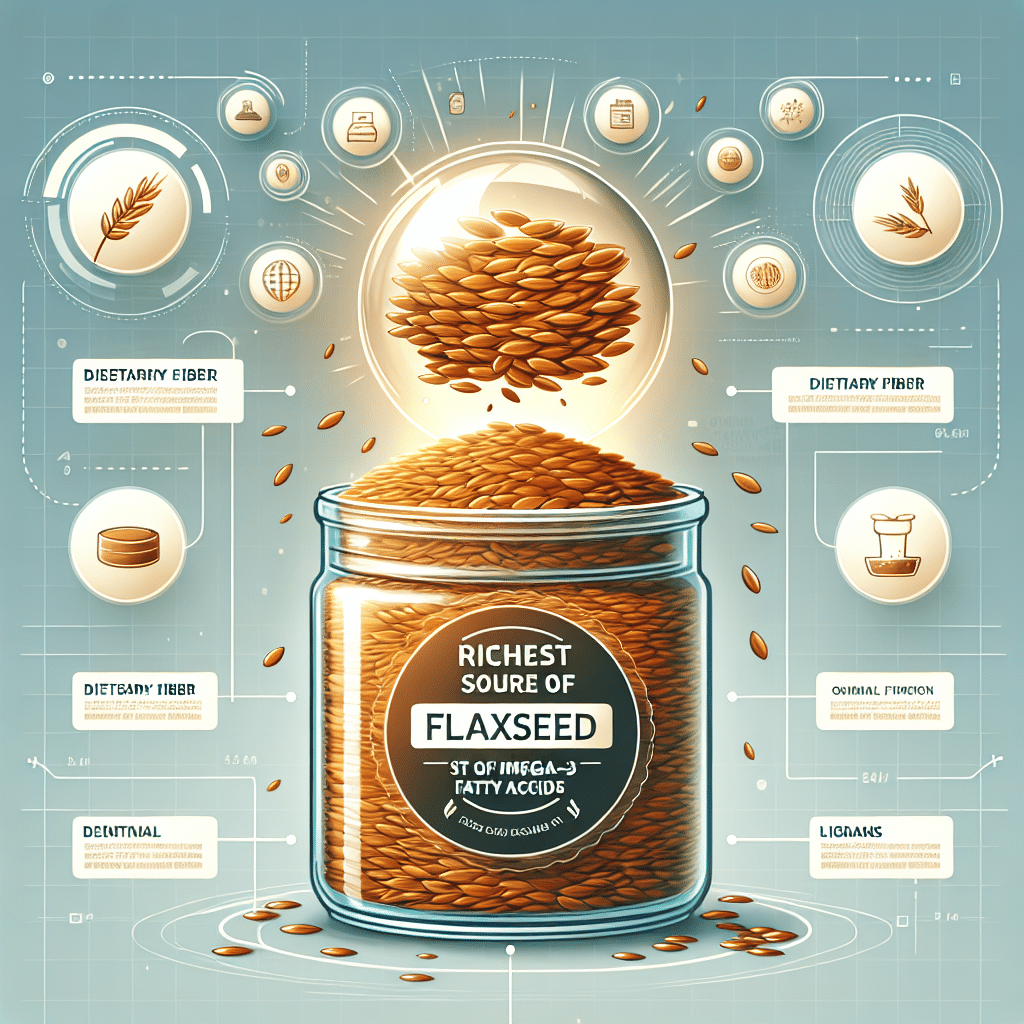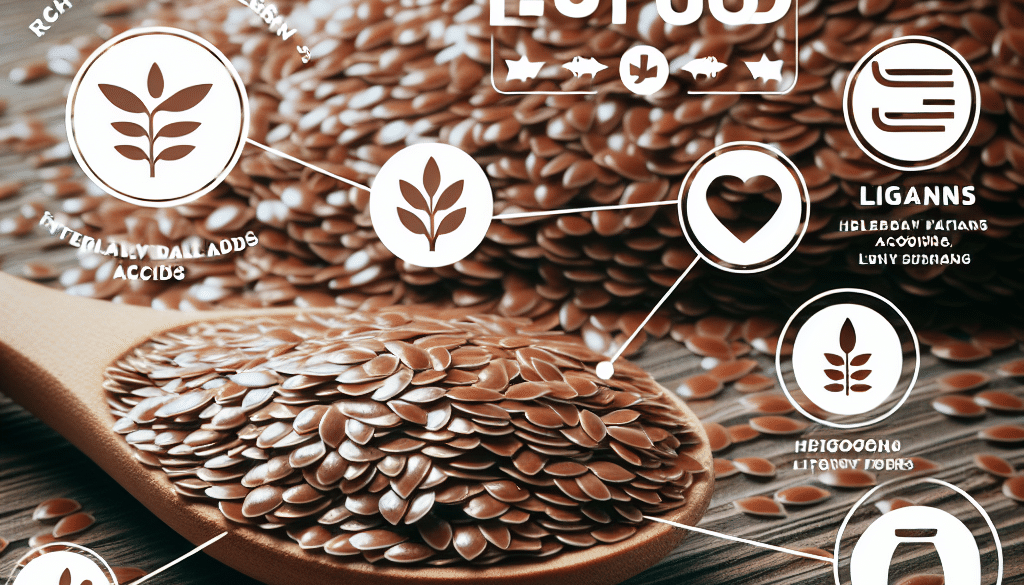What Is Flaxseed The Richest Source Of?
-
Table of Contents
- Flaxseed: The Richest Source of Nutritional Goodness
- Omega-3 Fatty Acids: A Heart-Healthy Component
- Dietary Fiber: Essential for Digestive Health
- Lignans: Flaxseed’s Antioxidant Power
- Protein: Plant-Based Source for Muscle Maintenance
- Other Nutritional Components in Flaxseed
- Case Studies and Research
- How to Incorporate Flaxseed into Your Diet
- Conclusion: The Multifaceted Benefits of Flaxseed
- Discover ETprotein’s Premium Protein Products
Flaxseed: The Richest Source of Nutritional Goodness

Flaxseed, also known as linseed, is a nutrient powerhouse that has been cultivated for thousands of years. Known for its rich composition of dietary fibers, antioxidants, and omega-3 fatty acids, flaxseed has gained immense popularity as a superfood. In this article, we delve into the nutritional profile of flaxseed and explore why it is considered one of the richest sources of health-promoting components.
Omega-3 Fatty Acids: A Heart-Healthy Component
One of the most celebrated components of flaxseed is its high content of omega-3 fatty acids, particularly alpha-linolenic acid (ALA). ALA is a type of essential fatty acid that the body cannot produce on its own, making it necessary to obtain it through diet. Flaxseed is one of the richest plant-based sources of ALA, which is known for its cardiovascular benefits.
- Reduces inflammation, which can help lower the risk of chronic diseases such as heart disease and arthritis.
- Decreases the risk of thrombosis by preventing blood platelets from clumping together.
- Helps maintain healthy cholesterol levels by reducing LDL (bad cholesterol) and increasing HDL (good cholesterol).
Dietary Fiber: Essential for Digestive Health
Flaxseed is also an excellent source of dietary fiber, both soluble and insoluble. The soluble fiber in flaxseed can help to slow digestion, increase satiety, and manage blood sugar levels. Insoluble fiber, on the other hand, adds bulk to the stool and promotes regular bowel movements, which is essential for digestive health.
- Supports weight management by promoting feelings of fullness.
- Helps prevent constipation and maintain a healthy gut.
- May reduce the risk of colorectal cancer.
Lignans: Flaxseed’s Antioxidant Power
Flaxseed is the richest dietary source of lignans, which are phytoestrogens with potent antioxidant properties. Lignans are known to have a protective effect against certain types of cancer, particularly hormone-sensitive cancers such as breast and prostate cancer.
- May help balance hormones, potentially reducing symptoms of menopause.
- Exhibits anti-inflammatory properties that can contribute to overall health.
- Protects cells from oxidative stress and damage.
Protein: Plant-Based Source for Muscle Maintenance
While not as high in protein as some other seeds, flaxseed still provides a good plant-based source of this macronutrient. The protein in flaxseed includes essential amino acids that are important for muscle repair and growth.
- Contributes to the maintenance and growth of muscle mass.
- Supports immune function.
- Can be a valuable protein source for vegetarians and vegans.
Other Nutritional Components in Flaxseed
Beyond the key components already discussed, flaxseed is also a source of various vitamins and minerals. These include B vitamins, which are vital for energy metabolism, and minerals such as magnesium, which is important for bone health and muscle function.
- Contains thiamine (vitamin B1), which is essential for glucose metabolism.
- Provides magnesium, which plays a role in over 300 enzymatic reactions in the body.
- Includes potassium, which is necessary for maintaining normal blood pressure.
Case Studies and Research
Several studies have highlighted the benefits of flaxseed in various health contexts. For instance, research has shown that flaxseed supplementation can help reduce blood pressure in individuals with hypertension. Another study found that flaxseed may improve cholesterol levels and reduce the risk of heart disease.
Moreover, flaxseed’s high lignan content has been associated with a reduced risk of breast cancer in postmenopausal women, according to a study published in the Journal of Clinical Oncology.
How to Incorporate Flaxseed into Your Diet
Incorporating flaxseed into your diet is simple and can be done in various ways:
- Add ground flaxseed to smoothies, oatmeal, or yogurt.
- Use flaxseed oil as a salad dressing or in other cold dishes.
- Bake with flaxseed meal as a partial substitute for flour in recipes.
It’s important to note that ground flaxseed is more digestible than whole flaxseed, which can pass through the intestinal tract undigested, preventing you from absorbing its full nutritional benefits.
Conclusion: The Multifaceted Benefits of Flaxseed
In conclusion, flaxseed is a rich source of omega-3 fatty acids, dietary fiber, lignans, and other essential nutrients that contribute to its status as a superfood. Its health benefits range from improving heart health to supporting digestive function and potentially reducing the risk of certain cancers. By incorporating flaxseed into your diet, you can take advantage of its diverse nutritional profile and contribute to your overall well-being.
Discover ETprotein’s Premium Protein Products
If you’re looking to enhance your diet with high-quality protein sources, consider ETprotein’s range of organic bulk vegan proteins. Their products, including rice protein, pea protein, and various seed proteins, are non-GMO, allergen-free, and characterized by a neutral taste. ETprotein’s offerings cater to a wide array of industries and dietary preferences, ensuring that you can find the perfect protein solution for your needs.
About ETprotein:
ETprotein, a reputable protein and L-(+)-Ergothioneine (EGT) Chinese factory manufacturer and supplier, is renowned for producing, stocking, exporting, and delivering the highest quality organic bulk vegan proteins and L-(+)-Ergothioneine. They include Organic rice protein, clear rice protein, pea protein, clear pea protein, watermelon seed protein, pumpkin seed protein, sunflower seed protein, mung bean protein, peanut protein, and L-(+)-Ergothioneine EGT Pharmaceutical grade, L-(+)-Ergothioneine EGT food grade, L-(+)-Ergothioneine EGT cosmetic grade, L-(+)-Ergothioneine EGT reference grade and L-(+)-Ergothioneine EGT standard. Their offerings, characterized by a neutral taste, non-GMO, allergen-free attributes, with L-(+)-Ergothioneine purity over 98%, 99%, cater to a diverse range of industries. They serve nutraceutical, pharmaceutical, cosmeceutical, veterinary, as well as food and beverage finished product distributors, traders, and manufacturers across Europe, USA, Canada, Australia, Thailand, Japan, Korea, Brazil, and Chile, among others.
ETprotein specialization includes exporting and delivering tailor-made protein powder and finished nutritional supplements. Their extensive product range covers sectors like Food and Beverage, Sports Nutrition, Weight Management, Dietary Supplements, Health and Wellness Products, and Infant Formula, ensuring comprehensive solutions to meet all your protein needs.
As a trusted company by leading global food and beverage brands and Fortune 500 companies, ETprotein reinforces China’s reputation in the global arena. For more information or to sample their products, please contact them and email sales(at)ETprotein.com today.












